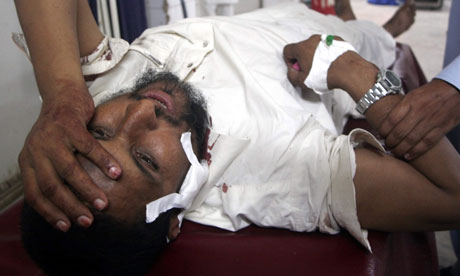
- News
- World news
- Pakistan
Pakistan mosque bomb kills at least 40
Explosion during Friday prayers at mosque in Khyber region wounds 100 in first major attack in Pakistan during Ramadan
- guardian.co.uk,
- Article history

A bomb ripped through a crowded mosque in Pakistan's tribal belt, killing at least 40 people who had gathered for Friday prayers and injuring more than 100.
The suspected suicide blast was in a village near Jamrud, the main town in the Khyber tribal region, close to the Afghan border. The first major attack in Pakistan during Ramadam, it is thought to be the work of extremists linked to al-Qaida. Some reports put the death toll at more than 50.
Locals speculated that the bombing was a revenge attack by the Pakistani Taliban after clashes between militants and tribesmen in recent days. Most of Khyber is not under the control of the Taliban or other militant groups, unlike much of the tribal area.
The injured were ferried to hospitals in Peshawar, about a 30-minute drive away, mainly in private cars as few ambulances were available locally. Between 300 and 400 people were at the mosque, which would have been packed for Ramadan – normally a time of piety and quiet contemplation.
"I don't know what happened or where the bomber came from," said a dazed Mustafa Kamal Shinwari, who was injured in the blast, speaking from his hospital bed in Peshawar. "Just poor people come to the mosque. Is this any way for Muslims to behave? Who-ever did this cannot be a Muslim, no matter what they say."
Inside the mosque blood was splattered across the floor and covered prayer caps and prayer mats. The walls and roof were scarred by shrapnel, the telltale sign of a suicide vest, which is usually packed with ball-bearings, nails and other metal projectiles.
Zahid, a resident who wished to remain anonymous, said the bomber was to one side of the mosque, against a wall. "If he had stood in the middle of the congregation, the carnage would have been to all sides and he'd have killed maybe a hundred," he said.
The bomb exploded in an area inhabited by the Kukikhel tribe. Earlier this month, Kukikhel militiamen blew up vehicles carrying a group of Pakistani Taliban in the Tirah valley, a remote and dangerous part of Khyber. More recently locals repelled an incursion by the Taliban. "The message here from the Taliban is that we can attack you at your home," said Zahid.
Most of the Nato supplies passing through Pakistan for soldiers fighting in Afghanistan go through Khyber, the most developed part of the tribal area.
A local official, Iqbal Khan, said the bomb detonated as worshippers were leaving after offering prayers. Bombs at mosques and other public places are usually not claimed by extremists, so as not to damage their image, leaving a vacuum in which wild conspiracies flourish about who's behind them.
"If this was a suicide attack, then they should do it in Afghanistan, against American or British soldiers. We are Muslims, so why target us?" said Saeed ur Rehman, who lives close to the blast site. "But I don't believe it was a suicide bombing. This was a (US) drone attack on the mosque."
Separately, a missile fired from an American drone killed four suspected militants on Friday in South Waziristan.
No comments:
Post a Comment